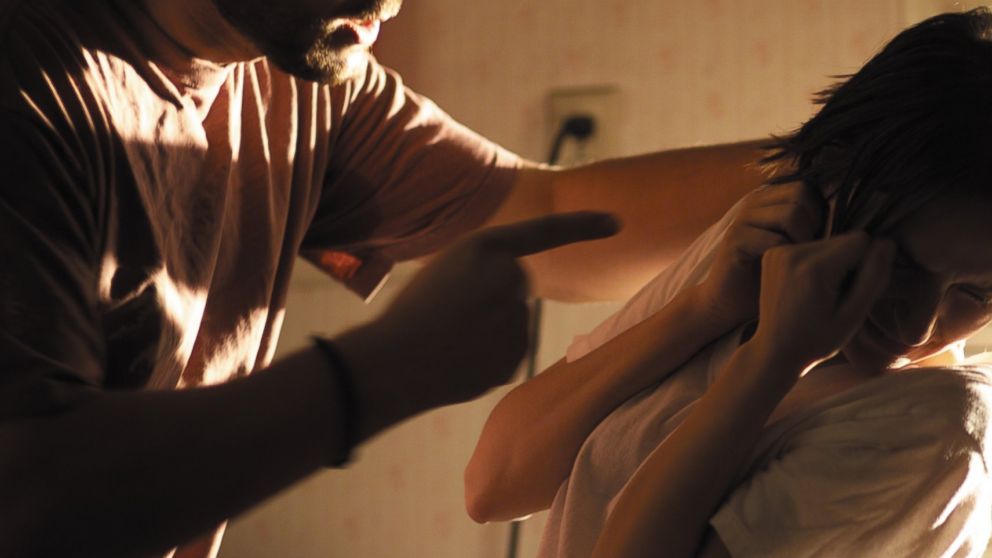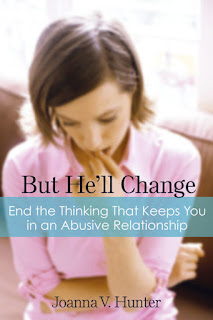In this series of posts presented by the amazing Joanna Hunter, author of But He’ll Change; End the Thinking that Keeps You in an Abusive Relationship, we will look at violence between intimate partners where the perpetrator is a male and the victim a female since this was her (any my) experience.
Joanna's Story
If he had hit me on our first date, there would have been no relationship. I would have called the police and had him arrested. Instead, he seemed a great guy; charismatic, daring, and self-assured—all the things I was not.
It was the beginning of my freshman year in college. Our gazes met across the bookstore. He strode up to me, introduced himself and kissed my hand. To an 18-year-old, that was heady stuff. We became a couple. He would take me on jaunts that were outside of my stuffy box, like climbing the fence to the football field late at night. We sat at the top of the bleachers, kissing under the stars. It felt daring and invigorating. He would chastise others who used foul language around me. Little did I know that he would later direct those same words at me. Having been reared to be a people pleaser, I was swooped up in the romance and never suspected that he wore a disguise.
We talked for hours. Actually, I talked for hours. He wanted to know all about me. For someone who was no more than a blurred-face in the high school crowd, it was flattering. It felt so good, I spilled my heart to him, describing my dream for the future. A dream he claimed to share.
He told me I was so sexy that he could not keep his hands off me. To be considered sexy was very intoxicating. He would say, “If it were four years from now, I’d marry you in an instant.” I believed that meant he loved me. Having planned to be a virgin until marriage, I limited our sexual activity. That was the late sixties—Make Love not War. Everyone was supposedly having sex. The fact that he was suffering by my withholding heaped guilt on me. When we were out together, he ogled other girls. I felt the weight of that. The first time we had sex, I became pregnant and we married.
A few months later, enraged, my husband slapped me across the face. I was stunned but let that incident go, thinking that it was a fluke and would not happen again. But, it did. The fourth time he battered me, he hit me so hard on the side of my head he popped my eardrum.
Embarrassed, I did not tell anyone. In the seventies people did not talk about this kind of thing. After three days with ringing in my ears, I knew I needed to see a doctor. I told him I was hit in the head with a ball, but would he check both ears. He never questioned me.
I remembered my mother saying that it was never okay for a man to hit a woman—never. One evening, when things were calm, I told my husband that if he continued to hit me I would leave.
His face blanched. He stood and went into another room, closing the door. I could hear him crying. I felt awful.
In a few minutes he came out and said, “I thought you loved me.”
I said, “I do. With all my heart.”
“But you would leave me.”
My people-pleasing heart was screaming, tell him you’ll love him forever, no matter what. My gut said don’t back down.
I listened to my gut and let that boundary stand. I did not believe it would hold, he had swaggered over any boundary I had set before. Why should this be different? After that incident, I believed that he was not hitting me because I did not make him angry enough. It was just a matter of time. During every subsequent incident I worried, would this be the time?
The emotional abuse became more severe. Instead of hitting me, he would pin me against the wall
and scream in my face, telling me what a stupid, worthless woman I was. It did not take many of those incidents for me to internalize this message. Like kidnapping victims, the survival mechanism known as the Stockholm Syndrome took over. [Footnote: The Stockholm Syndrome describes the behavior of kidnapping victims who, over time, become sympathetic to their captors. The name comes from a hostage incident in Stockholm, Sweden, in 1973. After six days of captivity in a bank, several kidnapping victims resisted rescue attempts and later refused to testify against their captors.] I was convinced that I was stupid, worthless and could not do anything right.
In the beginning I tried to tell my husband how I felt, reason with him. Instead of listening and hearing me out, he twisted my words and took the conversation off into a different direction, putting me on the defense. When I tried to clarify my point, he continued to misinterpret what I said and became enraged, frightening me into silence.
Like most victims, I believed I could handle things. I toed the line and stood steadfast in my belief that one day he would wake up and change. His partying without me was easy to explain away as that four years he needed before he would be ready to settle down. Consumed with guilt for getting pregnant, I minimized my own hurt feelings over his behavior and kept trying to be a better wife and mother. However, my husband continually raised his expectations so I could never quite get there.
During the almost 20 years I spent with him, he went to great lengths to tear down my self-confidence, humiliating and berating me. My husband would adamantly claim that I did things I did not do, Gas-lighting me [Footnote: It comes from the 1944 film titled Gaslight which depicts the crazy-making aspect of abuse where the abuser hides or moves items and accuses the victim of losing or misplacing them]. He was psychologically manipulating me into thinking I was losing my mind so I would no longer trust my judgments. He ignored my feelings. When I needed his help with an aggressive drunk at a party, my husband announced that he was not going to help me. It was his way of reminding me he held the power and would decide when or if he would be there for me. Would he help me if the situation was dangerous? I did not know. I felt helpless and alone.
I stayed because I loved him and believed that I could make a difference in his life. I stayed because I was a worthless and stupid woman. How could I care for my children on my own? He threatened to take the children away from me and I would never see them again if I divorced him. I believe he could. I stayed because he had a .357 Magnum. He never threatened me with it, but I knew it was there, loaded. I was afraid.
Toward the end of our relationship, during a tirade he slammed me into the wall and pressed his forearm into my throat until I saw spots before my eyes. “You gonna leave me now?” he demanded to know. In that moment I realized that he was not hitting me because he did not want me to leave. If I tried to leave now, I would no longer have that protection.
A short time later, he blew up at me during a gathering of friends. They were stunned because they had never seen this side of him. The men at the party protected me and made him leave. I truly believed that my husband would go home, get the gun and come back and kill me. That did not happen. Fortunately my children were visiting my parents in a different state. I called my mother and told her I had left my husband. She said, “Thank God, I’ve been praying for this.”
---
Joanna
Hunter knows what it’s like to live in the secret, terrifying world of
abuse. She did it for almost 20 years. She also knows that victims can
transcend domestic abuse and go on to live a joy filled life. She's done
that.
In her book,
But He’ll Change; End the Thinking that Keep You in an Abusive Relationship, Hunter discusses the components of abuse and identifies
over 100 unhealthy thoughts that victims embrace to cope with the abuse.
She teaches the reader how to counter those false-beliefs. Her book
received a 2011 Nautilus Book Award.
Since 2001, she has educated and shared her story with thousands of adults and teenagers through classrooms and community organizations.
She is a popular guest speaker at universities, where she trains
students in medical programs how to screen patients for abuse and how to
help victims. She volunteers at the women’s shelter in her area.
Connect with Joanna:
Facebook: A place where those touched by DV can join a caring community of survivors
Blog: Focuses on healing after abuse



No comments:
Post a Comment